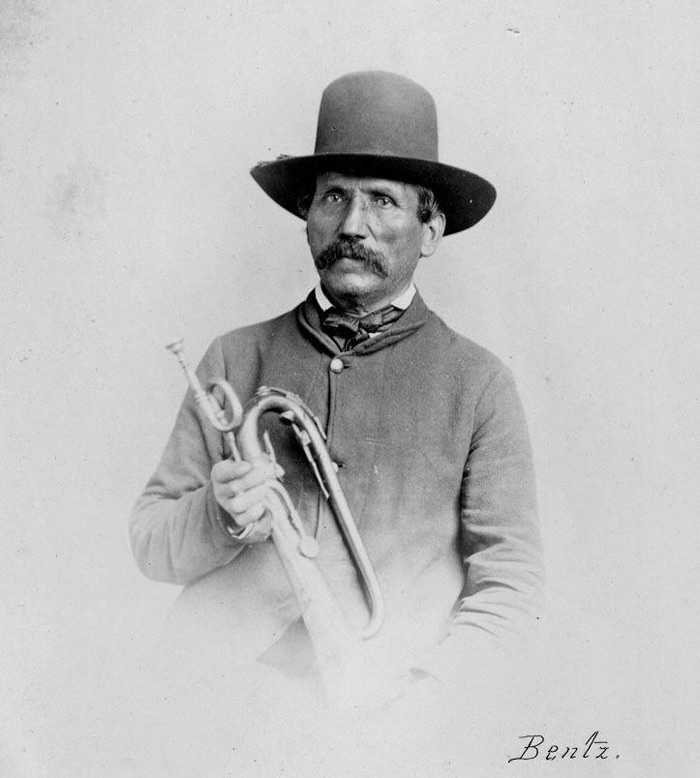
If you talk to any cadet about life at West Point, you are bound to hear about quiet mornings interrupted by the sound of a lone bugler playing reveille at 0530. Bugle calls have sounded across West Point since the days of the American Revolution. To this day, you can still see these tireless musicians at work, where they provide a musical setting for military movement, from morning to evening.
In the 200 plus years that musicians have been stationed at West Point, there is probably no musician more notorious, or cherished, than Private Louis Bentz. Born in Orlofen, Germany at the turn of the 19th century, Bentz (originally spelled Benz) was a former cavalry musician and a master of the keyed bugle. In 1834 he enlisted as a U.S. Army musician and served at West Point as the Chief Bugler for forty years, retiring in 1874.i But it wasn’t his musical prowess that won him the hearts of the Corps of Cadets. It was his eccentricities.
Over his four-decade long career at West Point, cadets knew Bentz as “Old Bentz,” “The Bugler,” and endearingly, “Old Wax.” Considering how cadets might tend to resent the person who wakes them up with a blazing bugle call at the crack of dawn, Bentz was beloved for his peculiarities. He was christened “Old Wax” due to his penchant for chewing honeycomb. It’s not an exaggeration to say that he always had a wad of beeswax in his mouth. When he had to play bugle, he would simply deposit the masticated wax on the instrument, and then pop it back into his mouth after he’d finished playing.ii Some might say that leaving chewed-up goop on your instrument is a disgusting habit, but the cadets apparently deemed it charming. Bentz’s bugle is housed at the West Point Museum, where one can see traces of old beeswax still stuck to the horn.
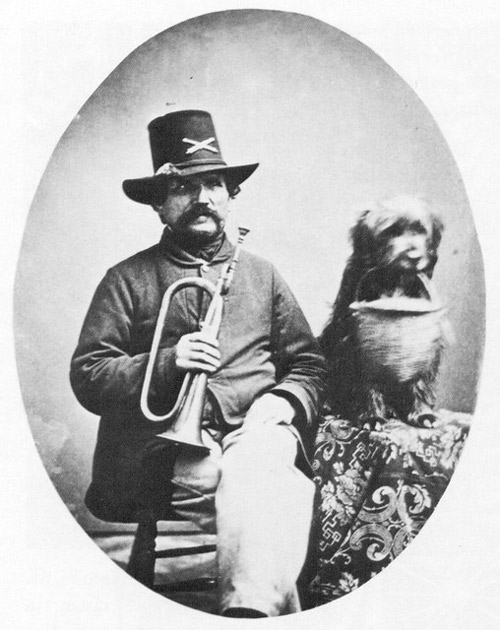
Around West Point, Bentz was often shadowed by his pooch Hans (also known as “Hanzi” and “Puff”.) Hans was often seen trotting behind Bentz, sometimes with his owner’s lunch pail in his mouth. Anecdotally, it has been said that Bentz was a fan of hooch, as well as his pooch. His playing of Reveille might have announced the day with military precision, but by the evening, his performances of Retreat and Taps often sounded a little bit more…relaxed. (If you want to hear some salacious stories of this fine bugler, you’ll have to ask a band member. The many episodes of Bentz’s boozy antics survive in the band’s oral history.) It has also been noted that over the years, Bentz’s bugle aged along with its master. One researcher mentioned that in looking through West Point yearbooks, the pictures of Bentz's instrument showed that he was losing keys as the years went by. If you visit his bugle at the West Point Museum, you can see not only bits of old beeswax, but also evidence of many home repairs.
While some repairs might have been required after so many years of use, it was also not unheard of for Bentz’s bugle to fall victim at the hands of prankster Cadets. According to General Hugh Lenox Scott, (1853–1934) who was a West Point graduate (and subsequently served in the Seventh Cavalry along with General George Armstrong Custer),
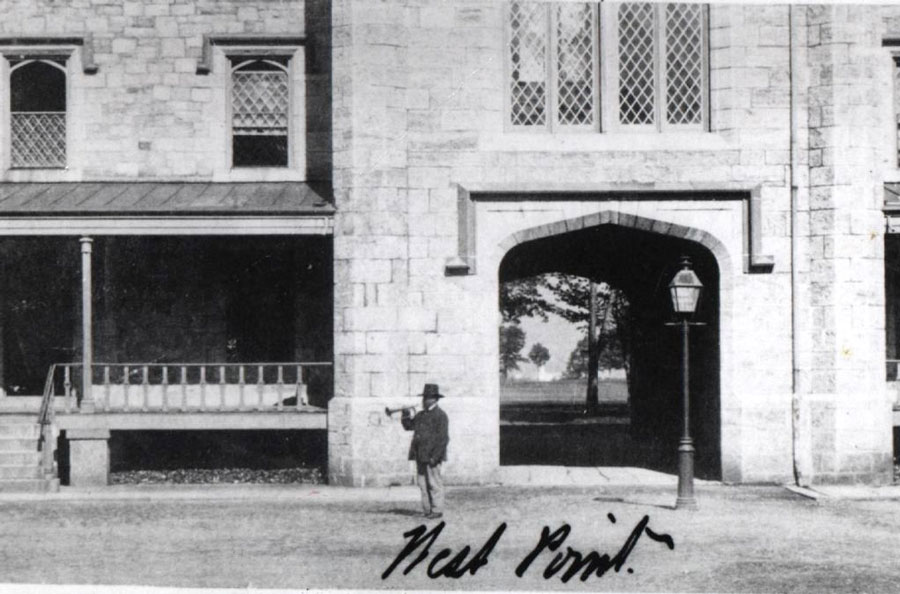
"There was…the ancient hydrant at which old Pvt. Louis Bentz, the bugler, who called Cadet U.S. Grant and others of fame to recitations before my time, used to wash out the ‘nails’ those bad cadets put in his bugle. Bentz, by the way lies out with the other honored dead in the cemetery above the river. His bugle is shown to visitors in the museum, where, the moment I laid eyes on it, I recognized the patches where his faithful fingers had worn through the metal."
Another curiosity surrounding Bentz is a mysterious fire that took place in his quarters on January 19, 1867. In a letter written by the superintendent, Colonel T.G. Pitcher to Major General Shriver in Washington D.C., Pitcher writes General:
"I have the honor to report that yesterday about 12 M. [midnight] in the midst of the terrific storm which has been raging from the Potomac to the North Pole for the last three days, we were startled by the alarm of fire when it was found that a small room in the basement of Cadet Barracks occupied by old Benz, the orderly bugler was actually on fire. The Fire Department was promptly on the ground and in […a few…] minutes after the alarm we had a stream of water playing on the fire and in a few moments it was extinguished, not however until nearly everything combustible in the room was destroyed. Had not the building been perfectly fire-proof nothing could have saved our entire establishment. A careful investigation failed to discover with any degree of certainty the origin of it, but it is believed to have caught fire from a pipe. I am taking every possible precaution against accidents from fire. We want a good Steam fire engine here very much. I wish you would try and get an appropriation for one, or get the Quartermaster General to turn one over to us. I am informed there was at one time a number in Washington belonging to the Quartermaster Department."
Nobody knows how the fire started, or if Bentz was in his room when it happened, though theories regarding the source of the blaze are still shared amongst band alumni.
Four years after retiring, Louis Bentz died in 1878 in his early 70s. For 40 years, Bentz had been a permanent fixture at West Point, and the memory of his daily bugle calls sounded long after his death. Today he rests under the shade of an oak tree in the West Point Cemetery next to his wife Rachel, who preceded him in death by two years. His monument is a testament to his popularity, for it was designed and paid for by the Corps of Cadets. Made of then-fashionable cast zinc, the inscriptions on its facades pay tribute to his service, citing him as “The Bugler,” “A Faithful Soldier,” and “Old Bentz”.
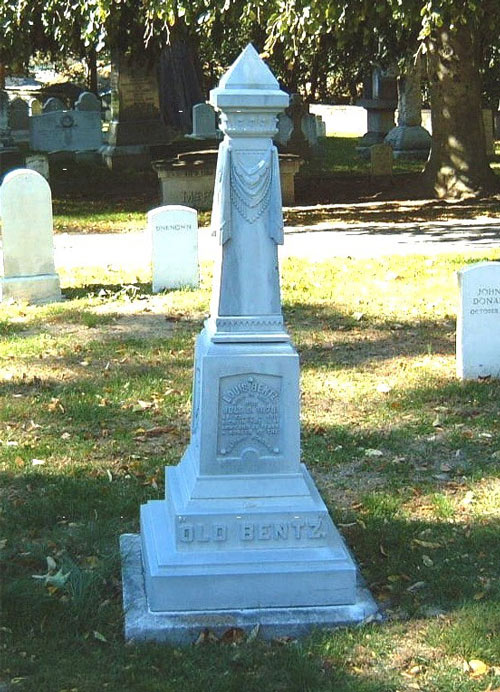
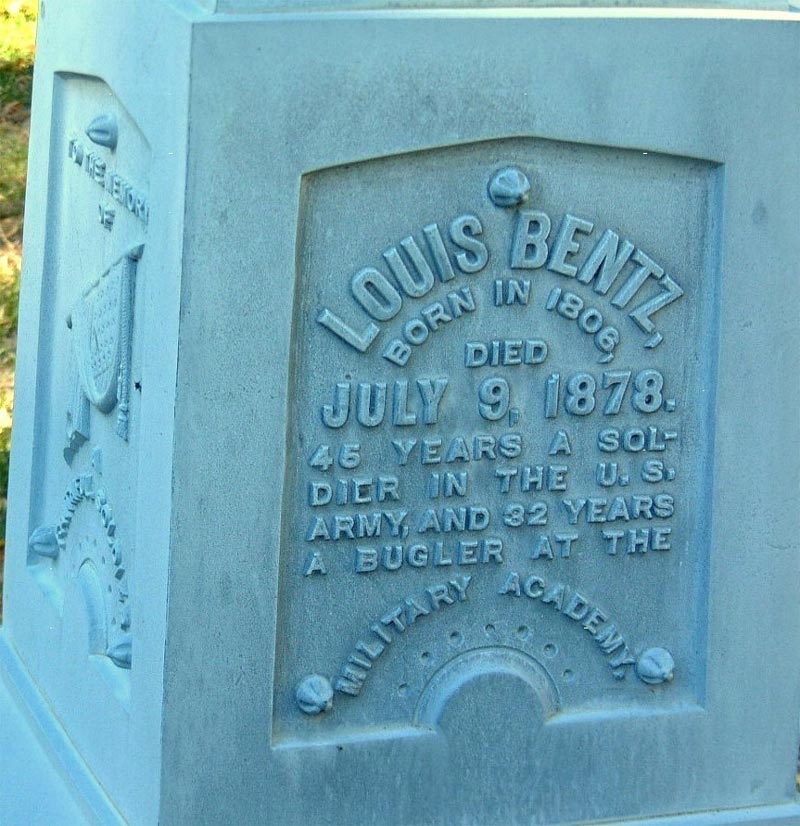
Louis Bentz is recognized as one of the most distinguished buglers in American history. He has been memorialized in the Taps Project at Arlington National Cemetery, and his name is registered on the official burial roster of the US Department of Veterans Affairs’ National Cemetery Administration as “LOUIS BENZ, PVT/BUGLER DET ART, USMA/US CADET CORPS, DATE OF DEATH 7/09/1878, BURIED AT: SECTION A, SITE 403, US MILITARY ACADEMY.”
Louis Benz (Bentz) was a US Army Musician and Chief Bugler of the US Military Academy for 40 years, 1834 -1874. He died in his early 70s, still on active duty at West Point. Born in Orlofen, Germany, the former cavalry musician was a master of the keyed bugle. Preceded in death two years earlier by his wife, Rachel, he remained devoted to his post at West Point. Often shadowed by his beloved pooch Hans and known for constantly chewing on a hunk of beeswax, Old Bentz’s eccentricities stole the collective heart of the Corps of Cadets, despite his job requirement of rousing them from peaceful slumber at 5:00 a.m. every morning.